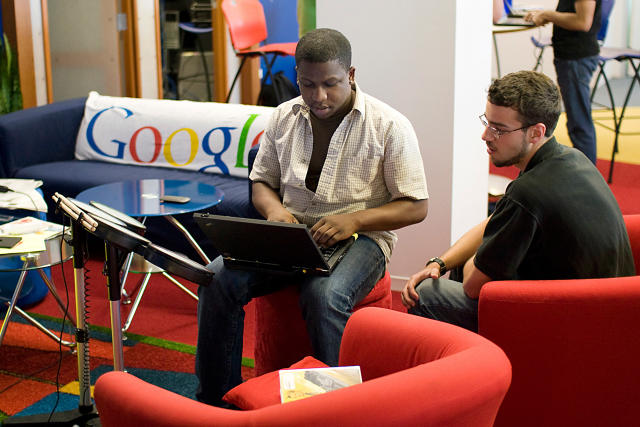The Skills It Takes To Get Hired At Google, Facebook, Amazon, And More
LinkedIn dove deep into its user data and produced a list of the top 40 U.S. companies for attracting and keeping talented employees.
Only three companies in the top 20 (Coca Cola, Under Armor, and Black Rock) were not in the tech industry. These days though, plenty of businesses consider themselves a part of that sector. Take the CEO of Goldman Sachs, who refers to the financial firm as a tech company. Furthermore, coding has become the most important job skill across industries.
As the LinkedIn report notes, with every company going through a tech-driven transformation, “being a talent magnet is going to be what separates the winners from the also-rans.”

Google cinched the top spot among the 40 top attractors. In addition to perks like free meals and massages along with a culture that supports diversity and the creation of the “perfect” team, Google has no trouble drawing candidates. One former Google recruiter estimated that he reviewed 3 million resumes in one year.
But what does it really take to get a job at the top organizations?
Tech knowledge, is of course, a requirement. However, Chris Bolte, the cofounder and CEO of Paysa, a big-data platform providing market insight about compensation and retention, says he’s seeing another trend that is clinching jobs for those without a traditional computer science degree.
“The most explosive growth we’re seeing is the emergence of deep learning,” says Bolte. He explains, “It’s a branch of machine learning and artificial intelligence leveraging what are called neural networks.”
At its simplest, the neural network functions like a web of interconnected brain cells inside a computer that can parse signals from images or video, for example. It can learn to recognize patterns and make decisions in a human way.
Bolte explains that deep learning extends a number of layers “deeper” than what was previously computationally feasible. He says given the amount of data Internet giants create, coupled with the advancement of computing, these deep learning methods are able to model signals more completely.
Artificial intelligence and machine learning as broader skills offer opportunity to a variety of tech talent. In a recent interview with Fast Company, senior machine learning recruiter at Microsoft Amanda Papp revealed: “Not everyone has to have that PhD in computer science. We have folks that have more physics backgrounds or biomathematics or permutational biology. [Machine learning] doesn’t necessarily have to have that standard comp-sci path.”
Paysa’s data shows that programming is still in high demand. At Google, for example, nearly half (45%) of its 60,000 employees know Java, and 42% know Python. Only 13% are knowledgeable in Git (open source software development), and 14% have skills in cloud computing. The majority (83%) of employees at Google have a bachelor’s degree, but only 7% come from Stanford. Other schools include Colorado School of Mines, Carnegie Mellon, and University College Dublin.
The No. 2 company on the list, Salesforce, has 20,000 people on staff, but their top skills are somewhat different than those at Google. As many as 46% know cloud computing and 39% are versed in agile methodologies (project management for software development). Eighty percent hold bachelor’s degrees and draw from schools such as University of California Berkeley, Southeast University, Arizona State, and University of Illinois at Urbana.

At Facebook, programming languages are in demand. Paysa data indicates that 46% of Facebook employees know Java and 44% know Python. Other top skills include C++, distributed systems, algorithms, and machine learning. Similar to the other two companies, most employees (84%) have a four-year degree, but 42% of Facebookers hold master’s degrees, too. This lends credence to recent research that more employers are looking to hire candidates with advanced degrees.
However, Apple isn’t pushing for higher education among all of its workforce. Only 71% of its 100,000 employees earned bachelor’s degrees, and 28% report not having a degree at all. This is due, in part, to the fact that not every employee is working on development in its Cupertino headquarters. This can also be seen in the most prevalent skill among Apple’s ranks, software development (28%), with Java coming in second at 27%.

Rounding out the LinkedIn top five is Amazon. The e-commerce juggernaut draws many of its staffers from nearby University of Washington in Seattle, and 83% of its employees hold bachelor’s degrees. More than half (57%) know Java, and 45% are skilled in software development. Surprisingly for the company that powers so many websites with AWS, less than a quarter (21%) are knowledgeable in web services.
Despite the focus on technical prowess, those in charge of hiring at both Facebook and Google are looking for more than just hard skills.
In a previous interview, Laszlo Bock, Google’s head of people operations, told Fast Company that Alphabet is looking for some very specific traits.
Four things: General cognitive ability . . . Not just raw [intelligence] but the ability to absorb information. Emergent leadership: The idea there being that when you see a problem, you step in and try to address it. Then you step out when you’re no longer needed. That willingness to give up power is really important. Cultural fit: We call it Googleyness, but it boils down to intellectual humility. You don’t have to be warm or fuzzy. You just have to be somebody who, when the facts show you’re wrong, can say that. Expertise in the job we’re gonna hire you for.
This is particularly important for candidates new to the job market. Hiring managers are looking for applicants who have developed soft skills such as communication, teamwork, and leadership, according to a survey by PayScale. As may as 60% of employers found critical thinking and problem solving lacking in entry-level job seekers.
Dan Schawbel, research director at Future Workplace, a cosponsor of the PayScale study, told Fast Company in a previous interview, “No working day will be complete without writing an email or tackling a new challenge, so the sooner you develop these skills, the more employable you will become.”
Fast Company , Read Full Story
(12)


